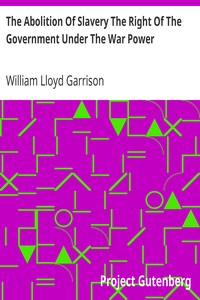The Abolition Of Slavery The Right Of The Government Under The War Power
"The Abolition Of Slavery The Right Of The Government Under The War Power" by William Lloyd Garrison and Others is a historical account written during the early to mid-19th century. This text presents an argument for the government's authority to abolish slavery under the war powers granted by the U.S. Constitution, particularly during times of civil conflict. It delves deeply into the legal and moral considerations surrounding slavery, particularly in the context
of the Civil War, emphasizing the right and necessity for the government to intervene. The book primarily consists of various speeches and writings, most notably those of John Quincy Adams, where he elucidates the concept that the war powers of Congress afford it the authority to interfere with the institution of slavery when the nation is embroiled in conflict. It contains discussions on the implications of warfare on civil liberties and rights, as well as historical precedents where military leaders effectively granted freedom to enslaved individuals during wartime. Adams argues that martial law supersedes civil law in war, thereby granting the President and military commanders the power to free slaves, transforming the legal landscape surrounding slavery during the growing tensions of the Civil War era. Through these analyses, the book underscores the profound moral imperative to end slavery as the nation confronts its own internal strife. (This is an automatically generated summary.)
Read or download for free
| How to read | Url | Size | |||
|---|---|---|---|---|---|
| Read now! | https://www.gutenberg.org/ebooks/17971.html.images | 79 kB | |||
| EPUB3 (E-readers incl. Send-to-Kindle) | https://www.gutenberg.org/ebooks/17971.epub3.images | 129 kB | |||
| EPUB (older E-readers) | https://www.gutenberg.org/ebooks/17971.epub.images | 127 kB | |||
| EPUB (no images, older E-readers) | https://www.gutenberg.org/ebooks/17971.epub.noimages | 95 kB | |||
| Kindle | https://www.gutenberg.org/ebooks/17971.kf8.images | 333 kB | |||
| older Kindles | https://www.gutenberg.org/ebooks/17971.kindle.images | 321 kB | |||
| Plain Text UTF-8 | https://www.gutenberg.org/ebooks/17971.txt.utf-8 | 68 kB | |||
| Download HTML (zip) | https://www.gutenberg.org/cache/epub/17971/pg17971-h.zip | 128 kB | |||
| There may be more files related to this item. | |||||
Similar Books
About this eBook
| Editor | Garrison, William Lloyd, 1805-1879 |
|---|---|
| Title | The Abolition Of Slavery The Right Of The Government Under The War Power |
| Note | Reading ease score: 53.3 (10th to 12th grade). Somewhat difficult to read. |
| Credits | Produced by the University of Michigan as part of the "Making of America" digital library (http://www.hti.umich.edu/m/moa/) |
| Language | English |
| LoC Class | E456: History: America: Civil War period (1861-1865) |
| LoC Class | KF: Law in general, Comparative and uniform law, Jurisprudence: United States |
| Subject | Slavery -- United States |
| Subject | War and emergency powers -- United States |
| Category | Text |
| EBook-No. | 17971 |
| Release Date | Mar 12, 2006 |
| Copyright Status | Public domain in the USA. |
| Downloads | 113 downloads in the last 30 days. |
| Project Gutenberg eBooks are always free! | |


